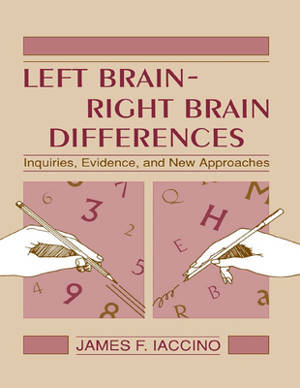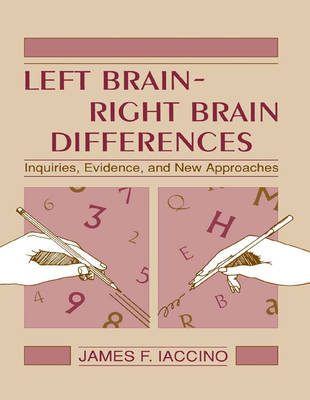
- Retrait gratuit dans votre magasin Club
- 7.000.000 titres dans notre catalogue
- Payer en toute sécurité
- Toujours un magasin près de chez vous
- Retrait gratuit dans votre magasin Club
- 7.000.0000 titres dans notre catalogue
- Payer en toute sécurité
- Toujours un magasin près de chez vous
Left Brain - Right Brain Differences
Inquiries, Evidence, and New Approaches
James F IaccinoDescription
This volume integrates past clinical findings with the latest research on cerebral asymmetry in order to identify why humans process information in different ways. A must for anyone who wants to understand human cognitive nature further, specifically the reasons why we are "wired" a certain way and whether these cortical circuits are flexible enough to be altered, this book presents the most up-to-date information on hemispheric differences within normal and clinical populations. Its focus on sex, handedness, and developmental differences is critical to the derivation of a better perspective on how future research should be conducted in this expanding science.
Iaccino begins by explaining basic brain structures and types of cognitive styles assigned to each hemisphere. He then details studies involving various clinical populations -- psychophysiological, split-brain, dyslexic, and psychotic -- to support the claim that the two hemispheres are different, morphologically and functionally speaking. Applying this clinical research to the more normal population, the author uncovers striking cortical variations between the sexes and between the handedness groups, along with developmental changes which occur as a function of time. Finally, he provides a detailed summary of the previous chapters and highlights where asymmetrical research may be headed in the future.Spécifications
Parties prenantes
- Auteur(s) :
- Editeur:
Contenu
- Nombre de pages :
- 296
- Langue:
- Anglais
Caractéristiques
- EAN:
- 9780805813418
- Date de parution :
- 01-07-93
- Format:
- Livre broché
- Format numérique:
- Trade paperback (VS)
- Dimensions :
- 154 mm x 228 mm
- Poids :
- 408 g

Les avis
Nous publions uniquement les avis qui respectent les conditions requises. Consultez nos conditions pour les avis.






